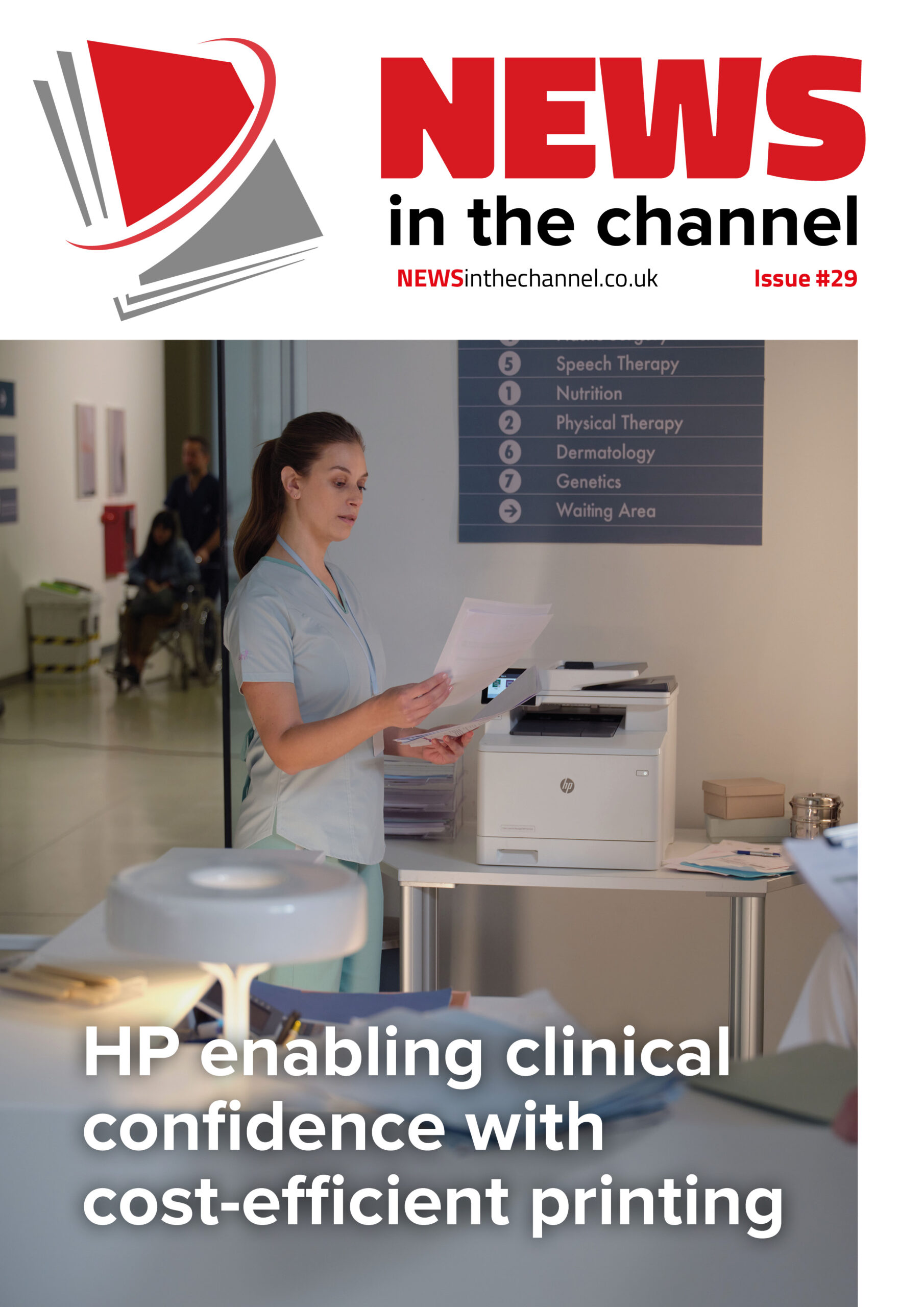Sharp has been widening its product range in the UK in recent years to include more IT and telephony technology, as well as its print products, which is helping to grow the business in the UK and Europe.
The UK market has not been easy over the past few years – the effects of COVID, supply chain problems, rising costs and inflation to name just a few of the problems businesses have had to weather.
It has meant many businesses have had to adapt, and Sharp has been doing that in recent years by widening its product and service offering and now the business is growing strongly in the UK and Europe, despite challenging market conditions, according to Colin Blumenthal, managing director of Sharp IT services.
“Sharp is on a journey of transforming into a technology business across Europe,” he says. “Sharp is widely known in the business-to-business community for managed print and print services. But while print is growing, IT services is a market that can deliver accelerated growth so there is a strategy to cross-sell IT services into Sharp’s client base across Europe and in UK.
“Some of the growth within IT services across Europe is delivered from that customer base of loyal SMB print-based clients who are now acquiring IT services from Sharp too.”
Making the right choices
But while Sharp has changed and expanded its product range, other things have remained constant – the culture to help clients make the right decisions when it comes to technology. “That’s what we are here to do,” says Colin. “And that has never changed. Of course, the technology has very much changed over the years, but we’ve always been able to stay ahead; we don’t use technology, we are leading it.
“We’ve always been at the leading edge and adapted our knowledge and our expertise to deliver technologies and services that our clients and prospects are going to find valuable and that continues today and will do so in the future.
“Part of the key technology shift has been the continued journey to cloud. And we are a long-established Microsoft partner with four competencies in the new partner programme. We’re well placed to offer the right advice to our clients and prospective clients on how they should navigate their journey to the cloud.”
Colin adds that the tough economic picture in the UK means that big capital projects need a lot of justification. “But cloud presents investment opportunities for businesses where large amounts of capital expenditure aren’t needed for a lot of organisations,” he says. “A lot of our project-related work is helping clients migrate to a cloud hybrid working environment, which cuts down on the capital expenditure that’s needed.”
Colin adds that there are some areas seeing more capital expenditure, such as business applications. “We deliver Microsoft Dynamics and that’s experienced good growth in the last year because businesses are valuing processes and how automating workflows can help improve their businesses,” he says. “But what’s equally important is management information, business intelligence and utilising the Microsoft Power platform to help deliver accurate, up to date, insightful information. That’s where we’re seeing businesses invest larger amounts of capital expenditure rather than rebuilding large IT infrastructures.”
Another growth area is hybrid working. “Sharp can advise clients on how to navigate successfully and securely the journey to hybrid working,” says Colin. “It was obviously forced upon businesses at the start of the pandemic, but since then a lot of businesses have found that it works for their business and employees, so they’re maintaining some level of hybrid working. That’s caused a shift in how they use technology and how that technology needs to be secured, and this is a critical conversation that we are having with our clients on an ongoing basis.”
Security
As Colin says, security for all business technology – whether in the office or elsewhere – is imperative as more devices become networked and therefore potential entry points for a cyberattack. “Again, we ensure we remain abreast of those technologies and Sharp is delivering appropriate security solutions to our clients that deliver what they need, at an affordable cost,” he says.
“But we still find that security is often overlooked. Sharp surveyed 5,770 businesses across Europe in 2023 – including about 550 businesses in the UK – and 34% felt that their users need better training and are a weak point potentially in any security solution that’s put in place.
“Sharp is launching cybersecurity awareness training throughout Europe to ensure that users are trained on an ongoing basis through simulated phishing attacks and other security topics like not downloading files, a strong password policy, etc. Security can be overlooked – businesses can buy loads of technology but forget about the users who can be the weak point if they’re not trained in security protection.
“Security has been an ongoing focus for Sharp and any good success MSP should be focusing on security for their clients too. The phrase that I use is we want our clients to work smarter but safer through better use of technology. There are two angles there: thinking about how technology can improve our clients’ business, growth and overall profitability, but also ensuring that within those parameters they’re working safely. That means having the right protection tools, but also ensuring that the users are kept fully trained on an ongoing basis. It isn’t just doing the training once a year, it’s got to be ongoing because if you don’t continue to reinforce training, it can fall by the wayside.”
Developing AI capability
Part of the security conversation now is the role of artificial intelligence (AI), Colin adds. “There are the bad threat actors out there who now have AI tools and can become even cleverer than they already are,” he says. “So therefore, cybersecurity protection, the tools we use, and the training need to be stepped up to reflect this.”
But there are positive uses for AI, and Sharp, with its emphasis on staying at the cutting edge of technology, is developing its AI capability and services.
“Internally, we’re testing how AI can make Sharp more efficient and even more professional in the services we’re delivering to our clients,” Colin explains. “AI is increasing our efficiency. For example, we are finding, especially in our meetings and email management, we’re saving people half an hour to an hour a day, which is a considerable saving.
“We’ve also got 10 people focused on Microsoft Copilot within our business – we call them Copilot champions – where we are testing it to see the efficiency gains it’s giving us and so we can become knowledges expert and then deliver consultancy and advice to our clients on it.”
Colin adds that it is crucial that Sharp makes its partners and clients aware that they need to be ready for AI. “They must be confident that their data is structured in the right way internally, that if they do deploy AI, it’s not going to uncover any information that shouldn’t be uncovered by people within your organisation,” he says. “Additionally, AI policies need to be created. The use of AI needs to be mandated within an organisation properly, so there’s lots of areas that we can add value to our clients and our prospects around AI.”
Colin adds that demand for AI is currently more from larger businesses. “SMBs are not necessarily going to be the early adopters of it, a lot are waiting and watching to see its impact. But we do have clients that have purchased Copilot and are using it and coming to us for advice. We see AI as a snowball that will gain momentum quite quickly. We need to be ready, and have the skills in place to offer the right advice to our clients so they can maximise Copilot and other AI tools out there. But with Copilot, being a Microsoft partner, we are ready to help our clients to get maximum value from it. As I mentioned, its about helping them to work smarter, that’s what it’s about.
“It’s about the mundane stuff that can potentially be done by AI – such as transcriptions or notes from meetings – allowing the team to focus on the higher value add tasks and deliver to their clients.”
Constant evolution
While Sharp is constantly evolving, so does Colin. He has had a long career in the sector, but has constantly adapted to the changing nature of IT.
Back in 1992, he co-founded IT business Complete IT, which he ran until July 2019, when it was sold to Sharp in the UK. As part of the deal, he joined Sharp too. Since March 2021, in addition to being managing director of Sharp IT Services UK, he has also been Sharp’s vice president of IT Services for Europe, responsible for the expansion of IT services throughout Europe for Sharp.
Change is something he is used to – and that he relishes, and always seeks to be at the cutting edge of technology, just as Sharp does.
As mentioned, Sharp is expanding its services to include more IT services, and many print vendors are doing similar throughout Europe, Colin says.
This is being done in part in the UK to offset the largely flat print market – although it varies in other countries, Colin notes.
“But, of course, each print vendor is looking for increased market share to boost their revenues in print too,” he adds. “Some sectors still have a large demand for print, such as education, which is why in the UK, Sharp has a strong presence in the education market.
“By expanding their service, they can maximise their value and maximise their reputation as well and build on the relationships they’ve built up through the provision of print services to now enter the world of IT services. That is the strategy that Sharp have in the UK and in Europe.”
Consolidating partners
Another consideration for expanding into IT services is that some customers are looking to consolidate the number of partners they work with. “Partly because it can be more cost-effective but also it makes it easier if the customer has an issue with technology – there is one number to ring, rather than having to define if it is a print or IT or security problem before ringing the appropriate person and getting the right service,” Colin notes.
“They want one person to take responsibility for the relationship and one invoice, rather than having multiple invoices from multiple vendors. There’s lots of improvements in efficiencies you can have by cutting down your suppliers’ partners. We are hearing from SMBs that this is something they want, and it is something we’re working towards delivering.
“We made good progress on new business; we have new business teams who sell the portfolio services that Sharp in the UK can deliver. We’ve already started joining together functions within the businesses in the UK to bring together that one supplier, one partner approach that we believe SMBs and other businesses are looking for.”
Telephony spike
Another developing area of products and services for Sharp as part of its drive to be an IT technology partner for its clients is telephony VoIP services. “With the switch off at the end of 2025 of the PSTN OSDN network, that will generate a large amount of potentially short-term demand for a shift to a voice environments for our clients,” says Colin.
“We have several offerings, which means we can be consultative in our approach and how we offer voice services to our clients. But that applies to all our services because we’ve got the breadth and depth of services and solutions that means we don’t just turn up with one solution, we turn up with the potential to deliver two or three. We can consult with our clients and propose the right service and the right solution for our client and/or prospect.”
Service is key
But while Sharp is a large business and has the resources and expertise to back it up, it doesn’t come at the expense of customer services and relationships, Colin notes.
“We want to build long-term relationships with our clients and bring a local feel to those relationships. We have several offices throughout the UK so that we can be the local partner for our clients but backed by a greater breadth and depth of skills and knowledge and expertise and availability.
“If you provide technology in addition to print, by the nature of that increase in services, you will have a closer relationship with your clients and your prospects. And those businesses, especially SMBs, want to see those partners and not just deal with them online and remotely. They want to feel that they’re engaged within their business and understand their business. To achieve that, you need to be on site in front of your clients and your prospects on a regular basis. One of the key services that we deliver is an IT roadmap for our clients, where we set out how their technology should develop in the coming year. They have a plan and give us a budget to deliver what they have agreed is the right technology roadmap for their business in the coming year.”
Future
For the future, Colin is optimistic, as Sharp continues its evolution in the UK and Europe. “We are looking to grow IT services as an overall percentage of Sharp’s business within the UK,” says Colin.
“And that’s through growing our organic offerings of services, but also as an acquisition strategy as well in major economic territories within Europe also, so it builds on two strands.”











